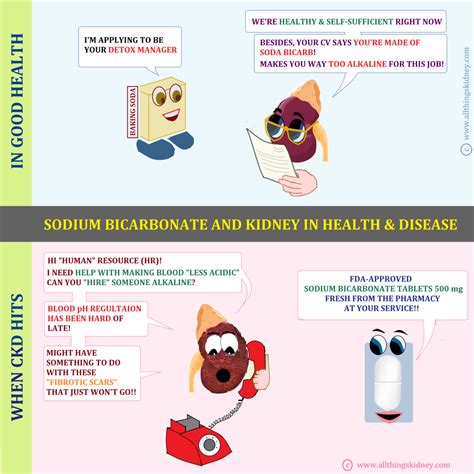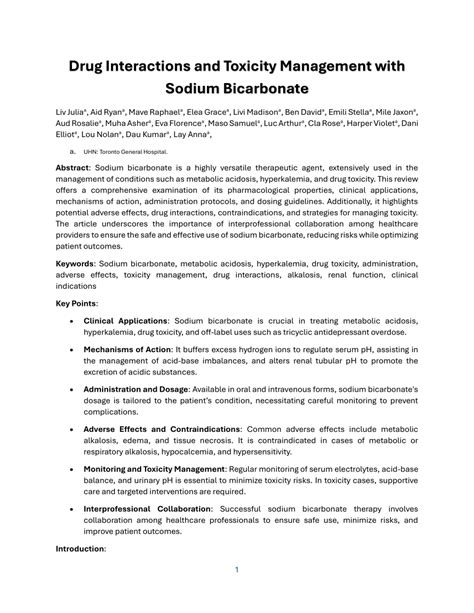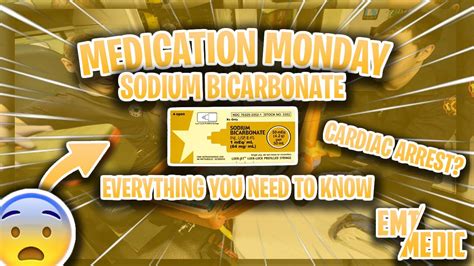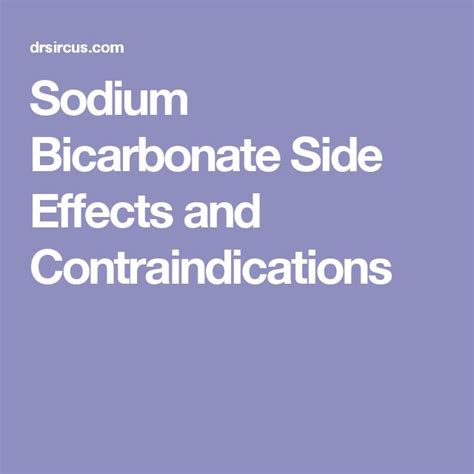Intro
Sodium bicarbonate, commonly known as baking soda, is a versatile household staple with a wide range of uses, from baking and cooking to personal care and health remedies. While it is generally considered safe and effective, sodium bicarbonate can cause some side effects, particularly when used in excess or by individuals with certain health conditions. In this article, we will delve into the potential sodium bicarbonate side effects, exploring the benefits and risks associated with its use.
The importance of understanding sodium bicarbonate side effects cannot be overstated, as it is a substance that many people use daily, often without giving much thought to its potential impact on their health. From relieving heartburn and indigestion to treating sunburn and insect bites, sodium bicarbonate is a popular natural remedy. However, like any substance, it can cause adverse reactions, especially when used improperly or in large quantities. By examining the potential side effects of sodium bicarbonate, individuals can make informed decisions about its use and minimize the risk of adverse reactions.
Sodium bicarbonate is a naturally occurring mineral compound composed of sodium, hydrogen, carbon, and oxygen. It is commonly used as an antacid to neutralize stomach acid and relieve heartburn, indigestion, and other digestive issues. Additionally, it is used in cooking and baking, as a cleaning agent, and in personal care products, such as toothpaste and skincare creams. While it is generally considered safe, sodium bicarbonate can cause side effects, particularly when used in excess or by individuals with certain health conditions, such as kidney disease, heart failure, or high blood pressure.
Sodium Bicarbonate Side Effects Overview

Common Sodium Bicarbonate Side Effects
Some of the most common sodium bicarbonate side effects include: * Bloating and gas * Stomach pain and cramping * Diarrhea * Nausea and vomiting * Increased thirst and urination * Electrolyte imbalances, such as high sodium levels These side effects are usually mild and temporary, resolving on their own within a few hours. However, in some cases, they can be more severe and require medical attention.Sodium Bicarbonate and Kidney Damage

Sodium Bicarbonate and Electrolyte Imbalances
Sodium bicarbonate can cause electrolyte imbalances, particularly an excess of sodium in the body. This can lead to a range of symptoms, including: * Muscle weakness and cramps * Fatigue and lethargy * Confusion and disorientation * Seizures and coma (in severe cases) Electrolyte imbalances can be life-threatening and require immediate medical attention.Sodium Bicarbonate Interactions with Medications

Sodium Bicarbonate and Pregnancy
Sodium bicarbonate is generally considered safe during pregnancy, but it is essential to use it responsibly and follow the recommended dosage. Excessive use of sodium bicarbonate during pregnancy can lead to electrolyte imbalances and other complications. Additionally, women with gestational diabetes or preeclampsia should consult with their healthcare provider before using sodium bicarbonate.Sodium Bicarbonate and Breastfeeding

Sodium Bicarbonate and Children
Sodium bicarbonate is generally considered safe for children, but it is essential to use it responsibly and follow the recommended dosage. Excessive use of sodium bicarbonate in children can lead to electrolyte imbalances and other complications. Additionally, children with a history of kidney disease or other health conditions should consult with their healthcare provider before using sodium bicarbonate.Minimizing Sodium Bicarbonate Side Effects

Conclusion and Final Thoughts
In conclusion, while sodium bicarbonate is generally considered safe, it can cause side effects, particularly when used in excess or by individuals with certain health conditions. By understanding the potential sodium bicarbonate side effects and taking steps to minimize them, individuals can use this versatile substance safely and effectively. Whether you are using sodium bicarbonate for cooking, personal care, or health remedies, it is essential to be aware of its potential risks and benefits.We invite you to share your thoughts and experiences with sodium bicarbonate in the comments below. Have you ever experienced any side effects from using sodium bicarbonate? How do you use sodium bicarbonate in your daily life? Your feedback and insights can help others make informed decisions about their health and wellbeing.
What are the most common sodium bicarbonate side effects?
+The most common sodium bicarbonate side effects include bloating, gas, stomach pain, diarrhea, nausea, and vomiting.
Can sodium bicarbonate cause kidney damage?
+Yes, sodium bicarbonate can increase the risk of kidney stones and worsen existing kidney disease, particularly in individuals with pre-existing kidney problems.
How can I minimize the risk of sodium bicarbonate side effects?
+To minimize the risk of sodium bicarbonate side effects, follow the recommended dosage and guidelines, consult with a healthcare professional before using sodium bicarbonate, and monitor your body's response to sodium bicarbonate.
